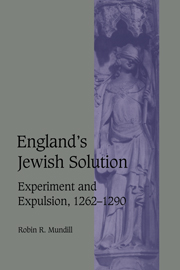Book contents
- Frontmatter
- Contents
- List of figures
- List of tables
- Preface
- Acknowledgements
- List of abbreviations
- Weights and measures
- Jewish nomenclature
- Chronology
- 1 The English Exodus re-examined
- 2 Jewish settlement, society and economic activity before the Statute of the Jewry of 1275
- 3 ‘The King's most exquisite villeins’: the views of royalty, Church and society
- 4 The royal tribute
- 5 The attempted prohibition of usury and the Edwardian Experiment
- 6 The economic fortunes of provincial Jewries under Edward I
- 7 The Christian debtors
- 8 Interpreting the English Expulsion
- Appendix I Places of jewish settlement, 1262-1290
- Appendix II The Statute of the Jewry, 1275
- Appendix III Articles touching the Jewry
- Appendix IV Charles of Anjou's Edict of Expulsion, 1289
- References
- Index
- Cambridge Studies in Medieval Life and Thought
5 - The attempted prohibition of usury and the Edwardian Experiment
Published online by Cambridge University Press: 16 October 2009
- Frontmatter
- Contents
- List of figures
- List of tables
- Preface
- Acknowledgements
- List of abbreviations
- Weights and measures
- Jewish nomenclature
- Chronology
- 1 The English Exodus re-examined
- 2 Jewish settlement, society and economic activity before the Statute of the Jewry of 1275
- 3 ‘The King's most exquisite villeins’: the views of royalty, Church and society
- 4 The royal tribute
- 5 The attempted prohibition of usury and the Edwardian Experiment
- 6 The economic fortunes of provincial Jewries under Edward I
- 7 The Christian debtors
- 8 Interpreting the English Expulsion
- Appendix I Places of jewish settlement, 1262-1290
- Appendix II The Statute of the Jewry, 1275
- Appendix III Articles touching the Jewry
- Appendix IV Charles of Anjou's Edict of Expulsion, 1289
- References
- Index
- Cambridge Studies in Medieval Life and Thought
Summary
‘He who practiseth usury goeth to hell, and he who practiseth it not tendeth to destitution.’ Thus wrote Benevenuto da Imola in the fourteenth-century when completing his commentary on Dante's Divine Comedy. His sardonic comment was clearly pertinent for the Anglo-Jew during Edward I's reign. It is now important to discover what kind of usurious practices earned the Anglo-Jew the universalenvy and hatred which was heaped upon him. This chapter will consider the way in which the Jewish business man conducted his affairs during what Vivian Lipman dubbed the ‘Edwardian Experiment’. It should thus become possible to assess the impact of Edward's programme for the reform of Jewish and Christian business practice and also his own general attitude towards usury. It should also help to establish whether the ravages of taxation and forfeits had an effect on Jewish business and whether on the eve of the Expulsion the Jewish community was so poor as to be financially i significant. Only after these central issues have been faced will the subsequent chapters consider the mechanics of Jewish moneylending on a local level and the effect of Edward's legislation. Thereafter attention will be turned to the varying fortunes of the principal Jewish communities, to the Jews’ clientele both before and after the Statutum de Judeismo of 1275 and finally to the several Jewish entrepreneurs who seem to have survived the ‘Edwardian Experiment’.
Naturally the moneylending profession and its context within the world of business and commerce must be given some thought. It has always been difficult to establish what constitutes a loan or an investment. All types of trade must strive to bring a profit.
- Type
- Chapter
- Information
- England's Jewish SolutionExperiment and Expulsion, 1262–1290, pp. 108 - 145Publisher: Cambridge University PressPrint publication year: 1998

